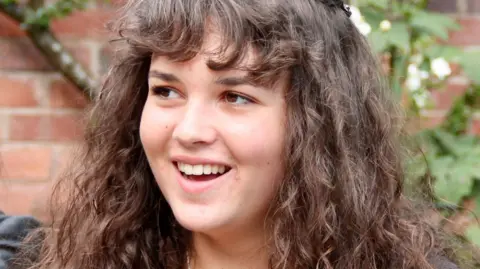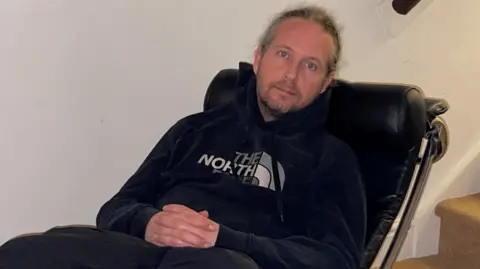 Family handwriting
Family handwritingMayo Boothby O’Neill’s Last Days The tormented 27-year-old was bedridden all day, unable to swallow food and unable to sit up – she was seriously ill with Myalgic Encephalomyelitis, or ME, and was severely malnourished as a result.
Her death has inspired Warnings from the coroner That other people can die the same way unless things change. The coroner concluded that care for people with severe ME was “non-existent”.
Mayo died at home after being hospitalized on three separate occasions in the months before her death.
This tragedy has highlighted the plight of people like her who feel they have no place.
 Family Handbook/PA Media
Family Handbook/PA MediaNicole, 52, has had severe ME, also known as chronic fatigue syndrome, for six years. He spends most of his time in bed with the light off and black curtains on the windows.
“My day ends with me closing my eyes in my bed, doing nothing,” he says.
“The light gives me a really bad headache, and it can make me vomit,” she adds. The sounds are also annoying.
Nicole’s 30-year-old daughter has given up work to take care of her mother – something that breaks Nicole’s heart, even though her daughter does with ease.
Nicole spoke to us after we asked for people’s experiences of ME care on the ME Community Facebook page.
Charity says there is At least 240,000 people with me Live in the UK, although exact figures are hard to come by. Around one in four of these people have severe or more severe ME, according to the charity ME Research UK.
It is a complex, chronic condition that can affect any part of the body and is difficult to diagnose. ME affects everyone differently and the causes are still being researched.
People with severe ME May have constant pain, sensitivity to touch and light, feel very weak and sometimes have trouble speaking or swallowing. There are many different symptoms that cause significant disruption in daily life.
‘Too tired to chew’
A big concern for Nicole is food. She has lost 120 pounds (54 kg) in the past two years.
“If I try to eat my body shuts down – I’ve had to spit food out before because I’m too tired to chew,” she explains.
Nicole’s GP referred her to a nutritionist but she has been waiting for almost a year.
She was told she lived in the wrong area for specialist ME care.
During the investigation into Mayo’s death, Coroner Deborah Archer It was revealed to her that there were no specialist hospitals or hospitals, beds, wards or other healthcare for patients with severe ME in the UK.
“Ninety-nine per cent of people with severe ME are looked after by relatives at home – bedridden, with limited contact and at risk of malnutrition,” says Dr Charles Shepherd, from the ME charity.
“GPs are really struggling to know what to do.”
“Hospitals just aren’t built for that,” says Sonia Chaudhary, executive director of Action for ME.
“Going to the hospital is a great insult or trauma to the body and lack of understanding of what it needs.”
The ME Society is calling for an audit to see how well the NHS is providing recommended care, as set out in guidance from the Institute for Care and Healthcare Excellence (NICE).
Their guidelines state that adults with ME should be referred to a specialist team so that a care and support plan can be developed.
People we spoke to said this does not always happen.
Baroness Finley of Llandaff was deputy chair of the committee that compiled the ME care guidelines, but spoke to us in a personal capacity. She said there was some support for people but it was “very complicated”.
“And the difficulty is that GPs may not know very well what is available – they are also busy with work and need to know about all the conditions.”
She said it is a challenge to meet the health needs of local people.
Some people find it difficult to travel, making it difficult to have a specialist center in a central location.
Baroness Finlay admitted that it is difficult for patients with severe ME to spend time in hospital wards because they are “not calm and quiet places”.
“It’s complicated – you have clinicians who are already on their knees. And the NHS estate is in a bad state.
“You have to make the best of what you have.”
‘My body won’t let me do anything’
 Khalil news
Khalil news Many people with ME recognize that the NHS is under pressure – what is less easy to understand, they say, is the behavior of some of the health workers they encounter.
Khalil Khaberi, 42, says his ME has “really gotten worse in the last two years” to the point where he has to stop doing property repairs.
“My body wouldn’t let me do anything and I ended up giving up on clients,” she says.
His first GP was very supportive and diagnosed him, he says, but another GP told him it was all in his head. He was also given information about conversational therapy and depression.
“I agree that it’s a depressive illness, but it’s not depression,” says Khalil.
Another person with severe ME, who did not want to be named, said she was abused while visiting the hospital a few years ago.
He says the doctor told him there was nothing they could do and he should stop wasting his time.
She now has a supportive GP who admits they don’t know much about ME, but at least believes in her condition.
She says that many people are stuck in the past, believing that this situation is purely psychological.
“It’s the stigma that we’re all lazy and we need to exercise ourselves back to health that has stopped us from getting the help we need.”
The charity says doctors’ minds are slowly changing to recognize that ME is a real medical condition, but there is still a long way to go.
“Medical training is lacking,” says Sonia Chaudhary of Action for ME, a view echoed by the coroner in Mayo’s case.
During the inquest into Mayo’s death, the coroner said it became clear that there was very limited training for doctors in Mayo and how to treat her.
 Khalil news
Khalil newsThe coroner’s report also highlighted the lack of funding for research into the causes of ME and the development of new treatments.
There is no cure for me. However, some treatments can help manage some aspects of the condition. There is no single test that can diagnose ME.
Baroness Finley says there is a “crying need” for more research.
A study currently underway involves Professor Chris Ponting’s team at the University of Edinburgh, where researchers are looking into the genetics of the condition.
Around 18,000 people with ME in the UK have given DNA samples for analysis.
“We hope the results will tell us what is going wrong for many people,” says Professor Ponting.
This will signal that research should move forward.
If, for example, genetics suggests that the immune system is involved then a whole army of immunologists working on other diseases can be brought on board.
This means they can quickly try and find new drug treatments “for this cruel and devastating disease.”
But Professor Ponting admits that no single research project can find the right treatment for everyone.
“It will require a major step change in research and clinical practice for people with ME in the UK to be treated in the same way as many other people who are treated for other diseases.
“They are forgotten, ignored and abandoned.”
Mayo’s father Sean O’Neill has already said That “very little has changed” in the three years since Mayo’s death.
“Hopefully the coroner will come up with something that will lead to change,” he added.
NHS England says improvements are needed within health services and across society to increase awareness and understanding of ME and to ensure patients and their families are listened to.
The Department of Health and Social Care says it is committed to improving care and support for all people affected, and plans to publish a plan this winter to boost research funding and improve the lives and attitudes of people with ME. make it better
A spokesman said: “Our deepest sympathies go out to Mayo’s family and friends in this tragic case. Every patient deserves to have their condition understood and treated to the highest standard, and this is a heartbreaking example. The patient has fallen through the cracks.
“Mayo and her family have been forced to fight an illness alongside a health care system that has repeatedly misunderstood and dismissed them.”
Need help? If you were affected by this story BBC Action Line website Provides a list of organizations that are ready to provide help and advice.
#poor #care
